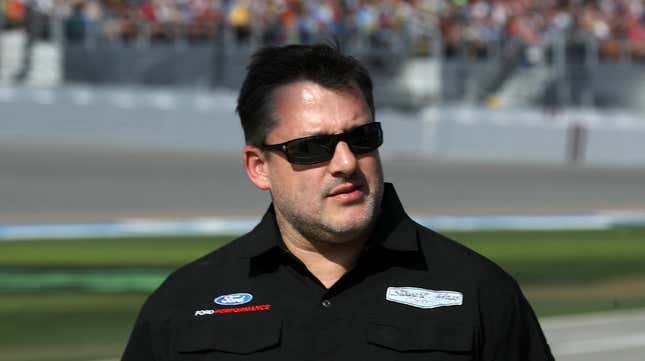
NASCAR’s ratings have been down for years now; a steady erosion of viewership thanks to complicated and ill-advised rules changes, in addition to bad politics, the latter problem it’s recently shown interest in trying to change. Now, Tony Stewart has a new racing series launching next year that is trying to fix the racing part.
The new series was reported this morning in stories in the Sports Business Journal and the Associated Press. Stewart is teaming up with NASCAR Hall of Famer and former crew chief Ray Evernham, former NASCAR COO George Pyne, and the agent Sandy Montag, all of whom are the series’ sole investors. It’s set to take place on short tracks in the “heartland of America” and run on dirt and pavement, with 12 drivers all using the same car.
The series, called Superstar Racing Experience, or SRX, has a deal with CBS to air the races on primetime on Saturday nights, but most interestingly, it sounds like it’s really gonna give a go at trying a lot of things NASCAR doesn’t do.
From the SBJ:
During interviews last week, SRX’s board members took pains to say the new group had no plans on competing with NASCAR. But it’s clear that they see openings where they believe NASCAR has fallen short. That includes:
■ A television strategy that will fit races into two-hour prime-time windows, presenting a contrast to NASCAR’s races that can run twice that long.
■ A focus on driver performance, rather than auto technology. Evernham will design the cars so that everyone races with the same equipment.
■ It will include racers and crew chiefs who are well known. Each race will have 12 drivers randomly matched with a crew chief.
■ It will feature racing under the lights at short tracks in the American heartland.
■ It is being positioned as an easier sale for sponsors that want to buy time on TV and at the event. “They make one phone call to be integrated in all aspects of the broadcast and the event,” Pyne said.
Further, the racing will be slower than NASCAR speeds, which can go north of 200 mph. Evernham thinks this might attract some big-name older drivers who aren’t keen on going full-throttle again. The list of tracks SRX is looking at is also interesting, from Connecticut to Indiana to Florida.
From the AP:
Evernham doesn’t expect speeds to exceed 150 mph on half-mile tracks, and he listed Stafford Motor Speedway in Connecticut, Five Flags Speedway in Pensacola, New Smyrna Speedway in Florida, Eldora, Knoxville Raceway in Iowa and Terre Haute Action Track in Indiana as possible venues. Evernham would also like a road course and a modified oval on the schedule.
“You know, drivers retiring and being out of the sport so young, we think there are guys who still want to race, still can race, but just don’t want to run 200 mph,” Evernham said.
Evernham’s dream list includes Scott Dixon, Tony Kanaan, Jimmie Johnson, Gordon, Juan Pablo Montoya, Paul Tracy and short track racers and up-and-comers who have proven their skills but can’t get a break.
This all might sound a lot like IROC, which died during the Great Recession and which Tony Stewart was the last champion of. That’s not a coincidence, as Stewart told the AP he was very much inspired by IROC. And while IROC died in 2008 after it couldn’t find a sponsor, Stewart says SRX plans to have sponsorship as well, presumably projecting that this time next year the coronavirus pandemic will less of a concern and the economy won’t be as bad as it was when IROC died.
The second question is whether ratings will be good enough for it to stick around, though according to SBJ, CBS’s deal is for multiple years, suggesting this won’t just be a one-off. It also sounds like Stewart and his partners are going about it the right way, with a slow ramp-up to next summer and ambitions that seem, for now, to be pretty modest.
My colleague Bradley Brownell said last year it was time to bring back IROC; his timing was only off by a little bit.